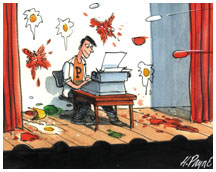Have an opinion about this issue of PAW? Please take a minute to click here and fill out our online questionnaire. It’s an easy way to let the editors know what you like and dislike, and how you think PAW might do better. (All responses will be kept anonymous.) |
To read our exclusively online On the Campus column, click here.
Illustration by Henry Payne ’84 |
March 23, 2005: On the Campus
Debating when humor crosses the line
By Jen Albinson ’05
A debate over humor and cultural sensitivity has emerged on campus, playing out in the pages of student publications, conversations across lunch tables, and e-mail exchanges stretching far into the night. Articles written by students have prompted discussion of free speech, generational indifference to history, and responsibilities as members of the broader University community.
This dialogue first developed in response to a Feb. 10 Nassau Weekly article, “Top 10 Holocaust movies I’ve never seen but would like to,” published under the broader heading of “And Now For Something Completely Offensive.” The list twisted the names of well-known movies, making Meet the Fockers into Exterminate the Fockers; Dude, Where’s My Car into Dude, Where’s My Family; and A Streetcar Named Desire into A Cattle-Car Named Desire. As one reader, Lauren Barnett ’08, noted, the Nassau Weekly is “known for slightly offensive, outlandish humor,” but many students felt that the Holocaust list went too far.
The debate increased when the latest issue of the Princeton Tiger landed outside students’ doors. It included an article, “Facebook Groups You Hope to Never See,” that ostensibly poked fun at the culture of informal online affiliations on the collegiate networking Web site thefacebook.com. The Tiger’s description of one such group, “People who are going to the national KKK meeting ... because they spit hot fiya!” prompted a response from the Black Student Union, which claimed that the magazine was deliberately and hurtfully parodying the Black Arts Company group on the Facebook, which had a similar title.
Some students and faculty members were outraged, others amused. An unofficial survey on the Undergraduate Student Government Web site found that of 335 voters, 12 percent found the Nassau Weekly list offensive, 20 percent found it funny, 35 percent fell into a middle ground, and the remaining third had not read it.
Hilary Herbold, associate dean of undergraduate students, was initially quoted by the Daily Princetonian as saying disciplinary action against the authors of the Holocaust list was “not out of the question,” but she defended the right of free speech in a letter to the editor the next day. By then, the idea that the administration might guide and censor content in campus publications had already upset many students. The Daily Princetonian editorialized on the right of student publications to free expression. Herbold later said that University policy draws a line between “objectionable and harassment,” with harassment, especially if directed toward an individual, warranting discipline.
The Black Student Union said it wanted to encourage a broader dialogue on community responsibility. “We’re hoping that after this, people will be aware that actions don’t happen in a bubble,” said Candace Lee ’06, president of the group. “We exist in a community, and actions can hurt people.”
Thomas Dunne, associate dean of undergraduate students, urged students to think beyond issues of free speech and ask questions like these: “What is the causal effect of the decisions we’ve made? Have we divided our community?”
Arlene Pedovitch ’80, interim director of the Center for Jewish Life, echoed this sentiment and offered support for students as they struggle with the enormity of the Holocaust. “It would be a different situation if I felt there was intent to cause hurt,” Pedovitch said. But the authors and editors of the publication, who “after all are just students,” were not deliberately trying to hurt their community, she said.
While the Nassau Weekly apologized for the list, writing that it had been “needlessly hurtful” and in “extremely poor taste,” the editors of the Tiger wrote in their response to the Black Student Union that “we do not intend to apologize for our content.”
Issues of cultural understanding, appropriate boundaries, and free speech on campus continue to provoke differing points of view. Ellen Charles ’06 said the Nassau Weekly list, while attempting to address what she saw as detachment from and trivialization of the Holocaust, also “participated in this trivialization and mockery, which crossed the line.” Marjorie Censer ’05, a former Daily Princetonian editor, said, “As a journalist, I obviously value a free press, and offending people is part of that.” Eddie Burgess ’07 called the reaction to the articles “unfair,” and questioned why Princeton students could not see the attempted humor of their peers.
Dunne has been working with those involved to plan a forum on freedom
of speech and appropriate boundaries. He said student publications underscore
Princeton’s role as “an intellectually open and engaged community,”
adding that recent discussions can help students get a “better sense
of where their opposing views come from.” ![]()
Jen Albinson ’05 can be reached at albinson@princeton.edu.
ON THE CAMPUS ONLINE: Click here to read more about “This Is Princeton” in Christian R. Burset ’07’s column, “Showing off; leaving ‘home.’”


